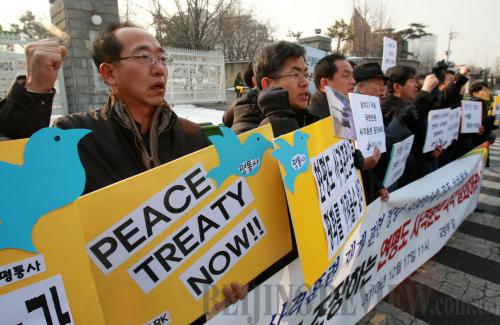|
 |
|
MILITARY ACTIONS OBJECTED: South Korean citizens in front of the Ministry of National Defense in Seoul protest their government's decision to launch another round of artillery drills on December 17, 2010 (XINHUA) |
Sharpened conflicts on the Korean Peninsula have offered the United States a perfect opportunity. After the Cheonan affair, the United States resumed control over Japan and cemented the U.S.-ROK military alliance. Now, it is attempting to bond these two bilateral alliances together. However, as the United States pursues strategic gains, the risk of war on the peninsula is increasing greatly.
It seems Washington prefers war, rather than peace, on the Korean Peninsula. The United States is the only country that has not halted military operations overseas since World War II. In addition, the Washington-Pyongyang feud is grounded in both historic and practical reasons. In the 1990s, the United States even planned a military strike against the DPRK. Therefore, it should come as no surprise if Washington conducts large-scale military action in East Asia after pulling out of the Middle East. The question is: How will the United States affect the future of the world?
Unless it has already made the decision to solve the Korean Peninsula issue through military means, the current refusal of dialogue with the DPRK is not a wise choice by the United States. Japan, the ROK and the United States established near-impossible tasks for the DPRK to complete in order to resume six-party talks. For example, they required the DPRK to ameliorate its relationship with the ROK. But how can the DPRK do this when the ROK is holding frequent military exercises? Current ties between the two sides obviously will not help to solve the Korean Peninsula nuclear issue.
Chinese efforts
Since the Cold War ended in the early 1990s, China has been prompting Northeast Asia, especially the Korean Peninsula, to terminate the Cold War state, realize reconciliation, and seek joint economic development. Recently, it has actively developed a "strategic cooperative partnership" with the ROK, while strengthening its traditional friendship with the DPRK. Meanwhile, it has encouraged China-Japan-ROK cooperation. Clearly, China does not want to see another war on the Korean Peninsula. That also explains why it is always advocating peaceful negotiations between the United States and the DPRK and between the ROK and the DPRK.
In May 2009, the DPRK launched its second nuclear test and declared it was abandoning the six-party talks. In early 2010, it agreed to return to the negotiating table at China's persuasion. However, the United States turned a cold shoulder to this good news.
After the Cheonan affair, China reacted cautiously, because if the affair was truly created by the DPRK, it could be serious enough to trigger a war. The DPRK leadership told China it had nothing to do with the affair. Moreover, opinions on the ROK's investigations differed, even within the country itself. In this context, China could only try to prevent further deterioration of the situation.
Instead of solving the issue bilaterally, the ROK submitted the issue to the UN Security Council. If the Security Council sided with the ROK, there would be little possibility to reconcile the Koreas, and the peninsula could face a war. Besides, the global collective security system would become instable, as the UN Security Council would lose its impartiality. In the end, the Security Council didn't support the ROK's conclusion, partly thanks to China's mediation efforts.
China also persuaded the DPRK to exercise restraint during the ROK's second round of artillery drills. But the United States and the ROK didn't echo the sentiment, as they continued to conduct military exercises, prolonging the crisis.
China always stands for solving differences through dialogue, and is against power politics and war. It hopes the ROK and the DPRK will seek reconciliation, rather than becoming the pawns of a superpower with its own interests in mind.
The author is an associate research fellow with the China Institute of International Studies |
